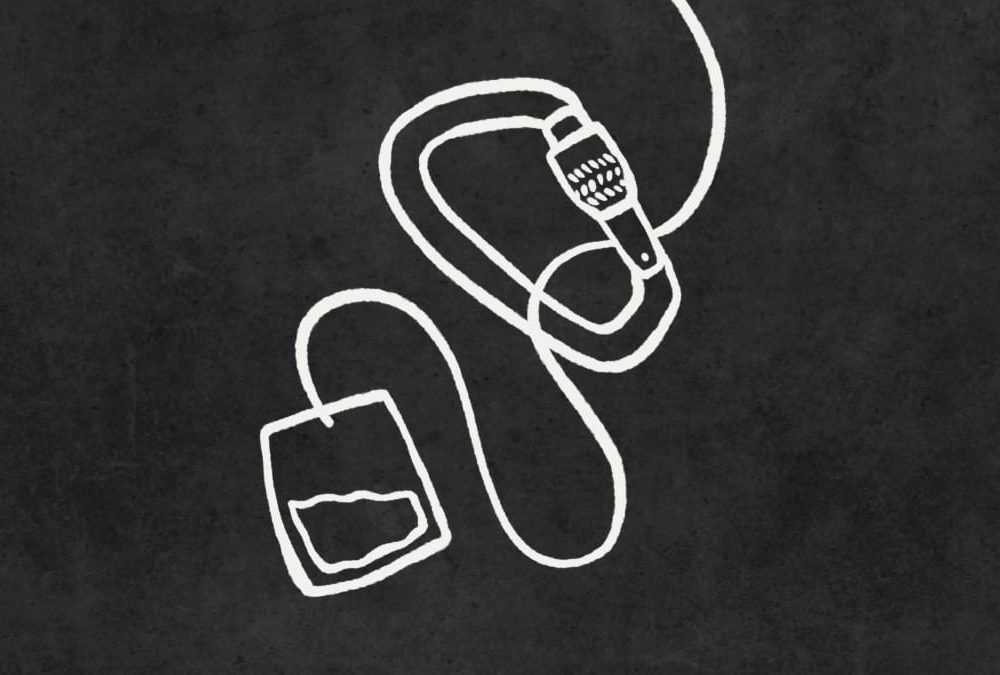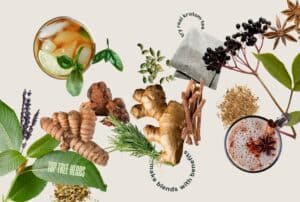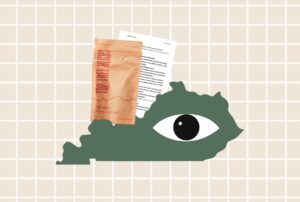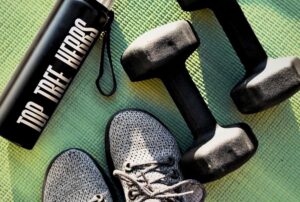In the world of rock climbing – where endurance, focus, and physical performance are paramount – climbers have long searched for how to optimize their nutrition to boost their performance. Obviously, the food you consume can affect your energy levels while climbing.
With sports supplements being all the rage today, “climbing supplements” have caused a stir. If you’re an avid and conscientious climber, you may have wondered, “What are the best climbing supplements, and are they worth it?” or “What are the best foods and drinks to eat for climbing?”
Well, wonder no more—we’ve got you covered. In this guide to climbing nutrition, we’ll cover food, supplements, and beverages, including one of the best teas for climbing—an ancient plant-based tea from Southeast Asian tradition, called kratom tea.
You may or may not have heard of this natural, caffeine-free beverage that’s emerging as a remarkable new option for taking your climb to greater heights. Fear not, we’ll cover everything you need to know about kratom tea and climbing. For starters, let’s get to the basics of what a good rock-climbing diet looks like.
The Importance of Fine-Tuning Your Rock-Climbing Diet
As both beginners and season climbers know, rock climbing is a physically demanding activity that requires strength, endurance, and mental focus. To excel at rock climbing, climbers need to make sure they consume the right foods and drinks to help maintain their energy and stamina.
When it comes to the rock climbing diet, it’s absolutely essential to fuel your body properly to support muscle recovery, enhance endurance, and maintain health.
What Are the Best Foods for Rock Climbing
The best foods for rock climbing provide a healthy balance of vitamins and macronutrients. You never want to underestimate the importance of consuming balanced macros.
- Protein: Important for muscle growth and repair, strength during climbing. Including plant-based proteins, such as lentils and nuts, helps boost your micronutrient intake
- Carbohydrates: improve protein synthesis and restore glycogen levels, supplying energy. The ideal ratio of carbs to protein for rock climbing should be between 3:1 and 4:1. Oatmeal is one of the best sources of carbs for rock climbing as it provides a solid dose of protein, fiber, and nutrients to give you lasting energy
- Fats: Help improve endurance by providing long-lasting energy and focus. Aim for 15–21% of fats in your diet. Nuts and seeds are an excellent source of healthy fats and nutrients for rock climbers.
When it comes to vitamins and minerals, the easiest way to ensure you’re getting enough nutrients to fuel your climb is by incorporating plenty of fresh vegetables, plant proteins, and whole grains into your rock climbing diet.
Fruits and dark leafy greens are always good sources of vitamins. Berries provide antioxidants that can help combat inflammation, while bananas provide potassium to prevent muscle cramps. Nuts and seeds are also easy to pack and make for a tasty, convenient snack.
Leafy greens like spinach and kale are rich in iron and other minerals that are crucial for oxygen transport and energy production.
Overall, consuming meals that offer a balance of protein, carbs, and fat can go a long way when it comes to keeping your physical and mental endurance up during a climb.
Tip: To make your climbing diet fun and easy, you can create a trail mix containing dried fruits and vegetables, nuts, and seeds.
What Are the Best Supplements for Climbing?
If your climbing diet is balanced and nutritious, you won’t need to take a whole slew of supplements. However, while a balanced diet should always be the foundation, outdoor enthusiasts may also look into climbing supplements to provide an extra edge. For those interested, here are some of the best climbing supplements.
- Super Green Supplements: If you struggle to include enough leafy greens in your diet, you may benefit from a “super greens” supplement powder. These provide a slew of vitamins and minerals found in various vegetables, grasses, and algae. They’re easy to include in a nutrient-dense green breakfast smoothie, which you can tailor to your palate and nutritional needs.
- Omega-3 fatty acids: Found in a number of foods and algae oil supplements, Omega-3s are an important part of any rock climber’s diet. There are a number of benefits of Omega 3s for post-exercise recovery, as well as for the mind and circulatory system.
- Vitamin D: If you do a lot of indoor rock climbing with limited sun exposure, you may consider supplementing with vitamin D, which plays a vital role in bone health and muscle function. Adequate vitamin D levels are crucial for bone strength and calcium absorption, reducing the risk of stress fractures and supporting overall skeletal health. If you think you may be deficient in vitamin D, you might consider taking it as a climbing supplement for maintaining bone density.
- Electrolyte Powders/Drinks: During intense climbing sessions, your body loses significant amounts of electrolytes through sweat. Electrolytes—such as sodium, potassium, magnesium, and calcium—are essential for maintaining proper hydration, nerve function, and muscle contractions. Consuming electrolyte-rich drinks or supplements can help replenish these vital minerals and prevent dehydration, cramping, and fatigue during lengthy climbs.
All things considered, if you don’t eat well, get enough rest, and prioritize muscle recovery, you can’t expect supplements to carry your climbing performance for you. Food is definitely the most important aspect of climbing nutrition; climbing supplements are only there to fill in the gaps. If you do use supplements for climbing, you can always combine them with your favorite food ingredients in one recipe!
Best Drinks for Climbing: Is Coffee Good for Climbing?
Now that we’ve covered some of the best supplements and foods in a rock climbing diet, let’s talk about beverages. While water is the most important drink for climbing and staying hydrated, some climbers wonder if they can get an energy boost from a caffeinated beverage.
While it might feel tempting to bring iced coffee with you on a climb, there are some potential drawbacks to consuming a caffeinated beverage such as coffee while rock climbing.
(Fun fact, did you know that coffee used to be prohibited?)
Many athletes drink coffee or other energizing beverages multiple times a day. Consuming too much of these drinks can greatly affect your stamina, endurance, and sleep.
- Caffeine can make some people sweat more, making them more likely to get dehydrated.
- Many people experience a “caffeine crash” several hours after consuming caffeine. For some, the initial coffee boost isn’t worth the feeling of fatigue in the end.
- Some people find that caffeine makes them jittery or messes with their stomachs, so if you’re sensitive to caffeine, you probably don’t want to drink something like coffee before climbing.
So what are the alternatives? When it comes to rock climbing, some people find matcha to be a better energy drink than coffee. However, for those looking to avoid the caffeine crash altogether, there’s another option that rivals coffee and matcha—and it’s a caffeine-free energy tea, called kratom tea.
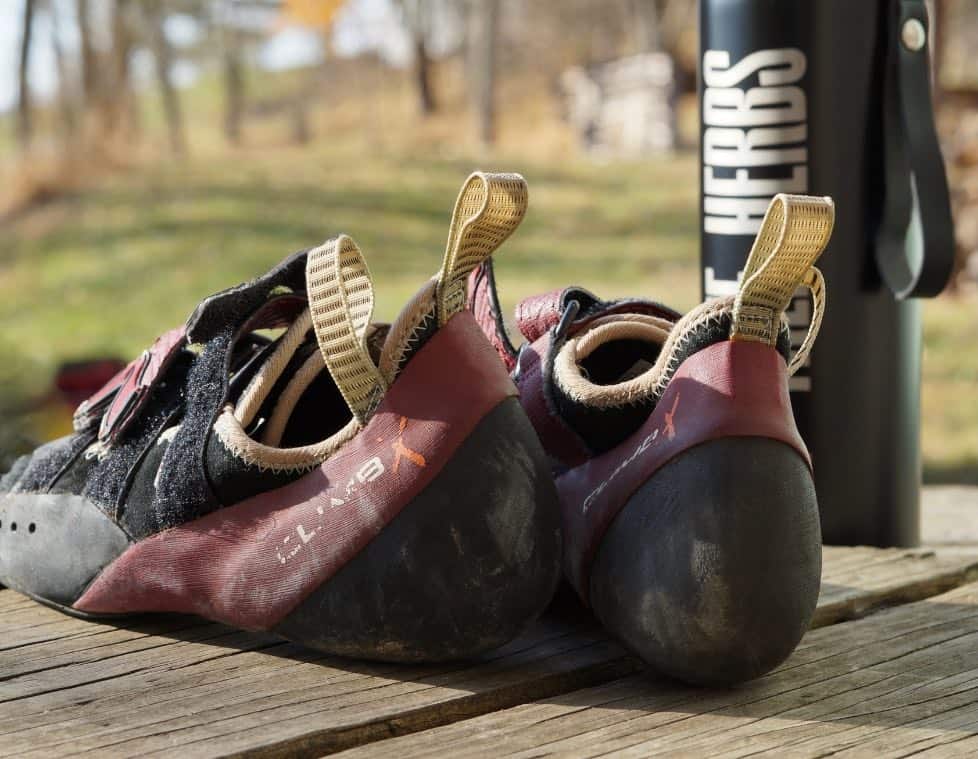
Although most people associate herbal teas with sleep and rest, some herbal teas actually can help you feel more prepped for your climb! And there’s no better energy tea for climbing than kratom!
In some ways, kratom tea is comparable to green tea, but with a few crucial differences that we’ll touch upon later.
Kratom vs. Caffeine for Climbing Nutrition
Why choose kratom over coffee (or another caffeinated drink) when you climb?
That said, kratom drinks and caffeine-containing drinks are not mutually exclusive categories. There are some mild kratom and caffeine recipes that are great for transitioning away from coffee, like a kratom matcha latte. While many people want to stop their caffeine intake altogether, it’s possible to create healthy habits that incorporate both kratom and caffeine together.
Often, people will have one cup of coffee in the morning and then, instead of drinking a second cup of coffee later in the day, they’ll make a cup of kratom tea. Late-afternoon caffeine consumption can impair your sleep (without you even realizing it). Drinking kratom in the afternoon instead of coffee can provide sustained focus without keeping you up late.
How Can You Enhance Your Rock Climbing with Kratom Tea?
When you think of what beverages to include in a rock climbing diet, you might think of dense energy bars and high-calorie gels, or sports drinks, coffee, and perhaps even beer. Many of these foods and drinks market themselves as products that will help you push through a hard multi-pitch or help you unwind and have a good time after your climb.
Yet, are these really the best option for climbing nutrition?
When you get down to it, kratom tea is by far the best drink to take rock climbing (aside from water, that is). We know this is a bold statement, but after years of experience climbing with kratom, we’re convinced.
The Energizing Effects of Kratom Tea
One of the main reasons why kratom tea is great for rock climbing is that kratom can have energizing effects. As you know that kratom doesn’t contain any caffeine, which is an active alkaloid found in the coffee plant, Coffea arabica. However, kratom leaves contain alkaloids such as mitragynine, among many others.
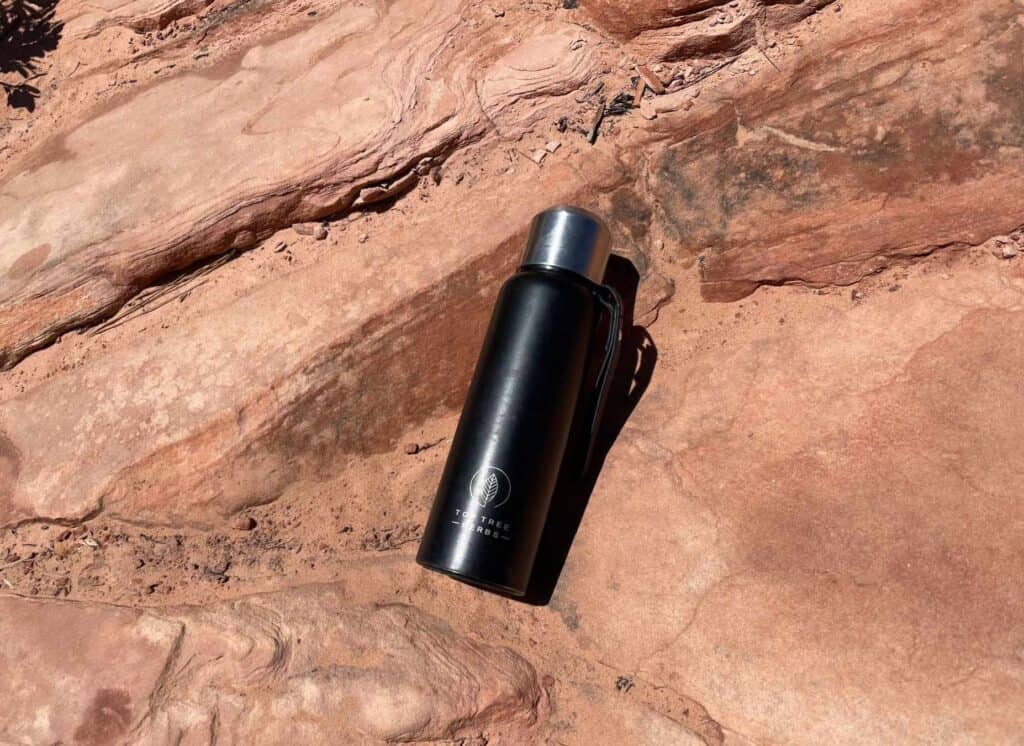
When consumed as a tea, kratom delivers a gentle and sustained lift. This makes kratom tea an ideal companion for your rock climbing adventures.
Unlike other energy-boosting drinks that may provide a sudden spike followed by a crash, kratom tea is more balanced and sustained. It can support your stamina throughout your climbs. And, unlike various climbing supplements, kratom tea is affordable and enjoyable to consume!
The secret to avoiding a spike-and-crash pattern is to limit (or completely cut out) caffeine. As kratom tea has no caffeine, it can support your motivation in a manner completely different from caffeine. Many people have completely replaced coffee with kratom tea without noticing any dips in their productivity.
Enhanced Focus and Mental Clarity
Rock climbing requires not only physical strength but also motivation and intention.
Another one of the remarkable benefits of kratom tea is that it has the potential to behave like a nootropic. Much like caffeine, kratom tea is a favorite among both students and athletes. The energizing effect of kratom tea isn’t constrained to just physical activity.
With kratom tea by your side (and in your stomach), you can experience heightened focus. This can help you make precise and calculated decisions while climbing. The mental benefits of kratom can be particularly advantageous when you’re navigating complex routes, assessing your next moves, and staying attuned to your surroundings.
Mood Balancer and Leg-Shake Tonic
Rock climbing can be physically and emotionally demanding. The sport provides you with an opportunity to push your body and mind to its limits, to learn and to grow physically and emotionally. This is another aspect of climbing that kratom tea really helps with.
Again, we can look to the traditional uses of kratom to see how kratom tea can be useful for climbing. In addition to drinking it before labor-intensive work, people have traditionally consumed kratom tea around campfires to unwind, socialize, and share feelings of goodwill with friends and neighbors.
These relaxing effects can similarly help you push through any feelings of fear or doubt during your next climb.
Kratom for Sewing Machine Legs
When you’ve overexerted your muscles, it’s easy to allow fear to swell in your mind. The physical and mental stress can induce shaky legs (also known jokingly as “Elvis legs” or “sewing machine legs“). You may experience this involuntary trembling in your limbs when you’re attempting extremely challenging moves or after you’ve gone through a long period of physical exertion.
How can you manage shaking limbs while climbing? To deal with sewing machine legs, it’s crucial to stay calm, focus on your breathing, and consciously relax the affected muscles. Drinking kratom tea won’t prevent “Elvis leg.” Yet it can certainly help you keep your focus, heighten your ability to breathe through fear and calm your nerves.
Kratom tea isn’t a shortcut to success, but rather a helpful tool. With practice and mental resilience, climbers can overcome this obstacle and continue their ascents.
Support Endurance and Stamina
Endurance is key in rock climbing, especially during long routes or multi-pitch climbs.
Researchers have not yet studied the effect of kratom tea on physical endurance. However, kratom tea has been anecdotally associated with increased endurance and stamina for centuries.
By incorporating kratom tea into your pre-climbing routine, you may experience improved endurance, so you can push yourself further and tackle more challenging climbs.
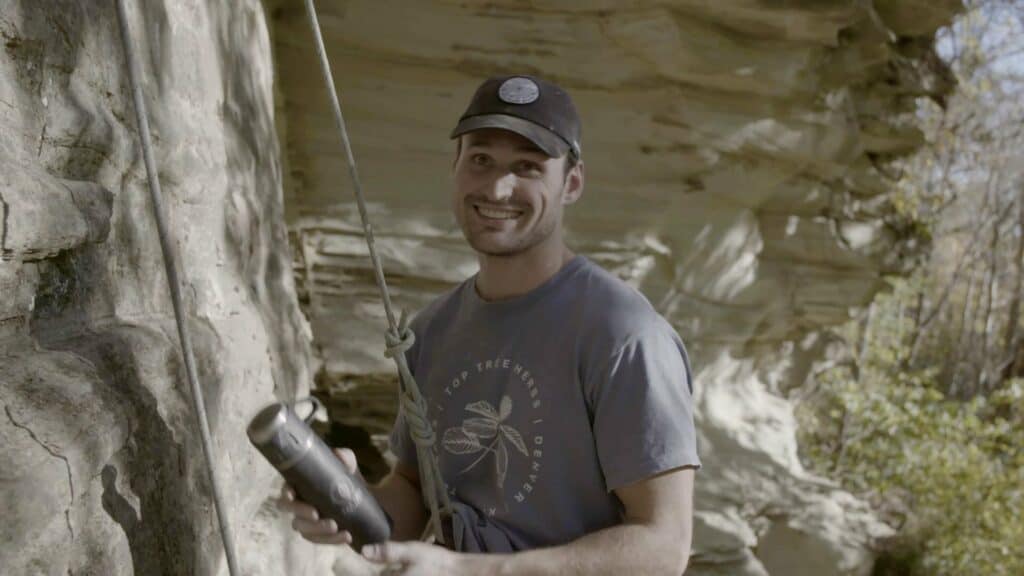
The sustained boost and mental alertness provided by kratom tea can contribute to enhanced climbing performance, helping you conquer new heights.
Choosing the Right Kratom Type for Rock Climbing
When it comes to rock climbing, not all kratom types are created equal. Depending on your preferences and goals, certain types of kratom may be more suitable than others.
Here are the three main types of kratom tea, and how rock climbers might benefit from each of them:
1. White Vein Kratom for Climbing
White vein kratom varieties are often associated with energy, focus, and mental clarity. They’re a great choice for anyone that wants to develop a mental edge while climbing. White vein kratom tea is also the number one choice for those looking to replace caffeine with kratom.
2. Green Vein Kratom for Climbing
Green vein kratom tea is valued for its balanced effects, as it offers both focus and a sense of calm. It’s a great choice for when you’re working on a tough climbing project. Green vein kratom teas may provide a sustained energy lift without compromising on the relaxing benefits, making green vein kratom tea suitable for longer climbing sessions.
3. Red Vein Kratom for Climbing
Red vein kratom tea is loved for promoting relaxation and a sense of calm – it can make packing your gear and chatting with your partner all the more enjoyable at the end of your climb. Drinking red vein tea can also help you to unwind and recover in the hours and days after an intense climbing session.
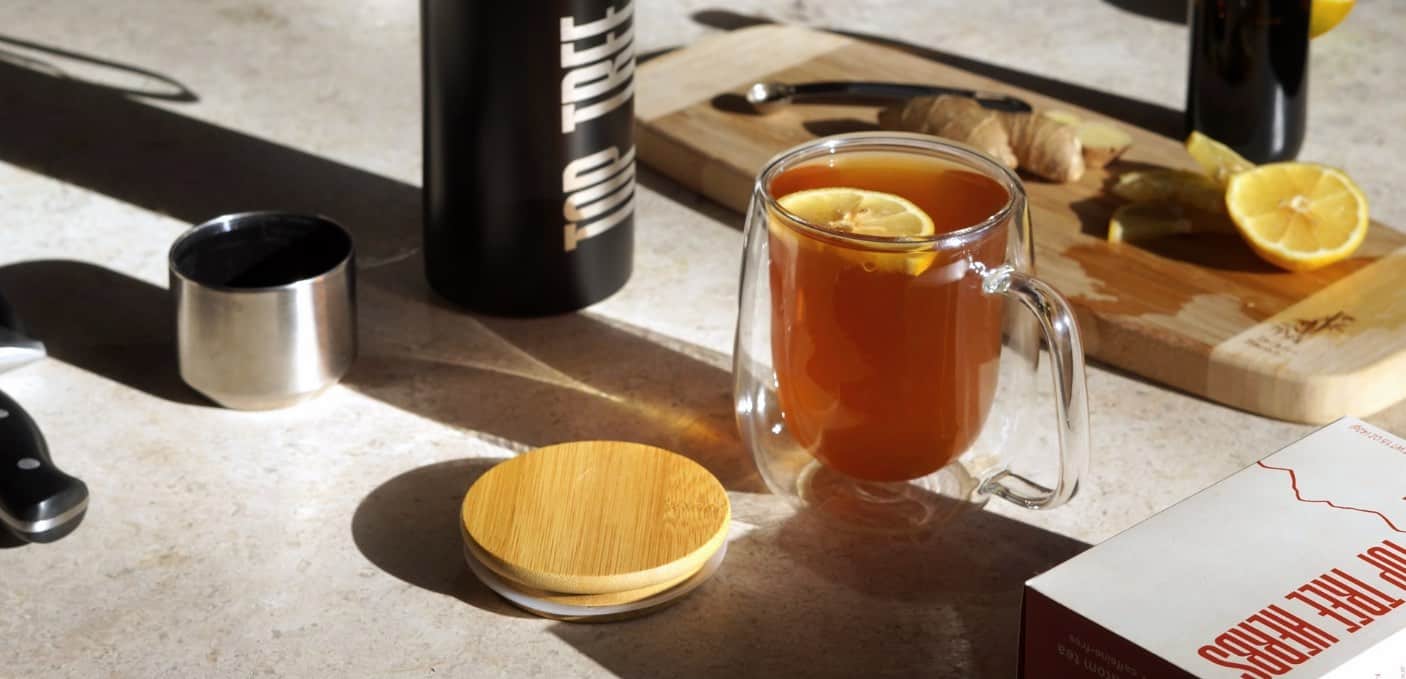
How to Prepare Kratom Tea for Climbing
There are a lot of different ways that you can prepare kratom tea so that it best fits within your climbing diet.
On hot days, you can make kratom iced tea. You can even dilute it a bit with water to stay extra hydrated. Additionally, you can blend up chilled kratom tea into an electrolyte-and protein-packed kratom smoothie or juice. You can even
Safety Considerations and Moderation
While kratom tea can offer benefits for rock climbing, it’s essential to approach consuming it with safety and moderation in mind. As with any herbal product or new-to-you food, individual responses and sensitivities can vary.
It’s recommended to start with a small serving size (one or two tea bags) and assess your reaction before consuming more. Do your best to buy only high-quality kratom from reputable vendors to ensure you are getting pure kratom and to minimize the risk of contamination or inconsistency.
Additionally, it’s always a good idea to consult with a healthcare professional before incorporating kratom tea into your rock climbing routine. This is especially important if you have any underlying medical conditions or are taking any medications.
At the end of the day, every activity has risks – especially those that are rewarding. However, there are easy ways to minimize these risks and maximize the rewards of doing the activities you enjoy. One great first step is to educate yourself on how others before you have gone about doing things. This applies to both rock climbing and drinking kratom tea.
We recommend reading articles, papers, and blog posts from people with different opinions on kratom (and how to use kratom for exercise) before trying it yourself. Many scientists have stated that kratom tea carries about the same probability of habituation as coffee; while the risks are minimal, they do exist.
Climbing Nutrition on and off the Wall
Most athletes know quite well that eating a nutritious diet shouldn’t be relegated to game days. To reach your goals, you have to create healthy habits for everyday life, not just when you’re on your way to go climbing.
Eating healthy food is an essential aspect of climbing nutrition, but don’t overlook the impact that drinks make as well. Kratom tea isn’t just beneficial on the days when you go climbing. It can also be incorporated into your climbing nutrition plan for the days in between.
Sip It Then Send It
With its energizing effects, enhanced focus, and mood-balancing capabilities, kratom tea offers a natural and holistic approach to support your climbing endeavors. Plus, there are so many other times and purposes that kratom tea is good for. Just remember to choose the right type, practice moderation, and prioritize your safety.
The next time you embark on a rock climbing adventure, don’t forget to pack your climbing gear and a thermos of kratom tea to elevate your climbing to new heights.
If you want to watch how others incorporate kratom tea into their climbing routine, check out our climbing and kratom documentary.
